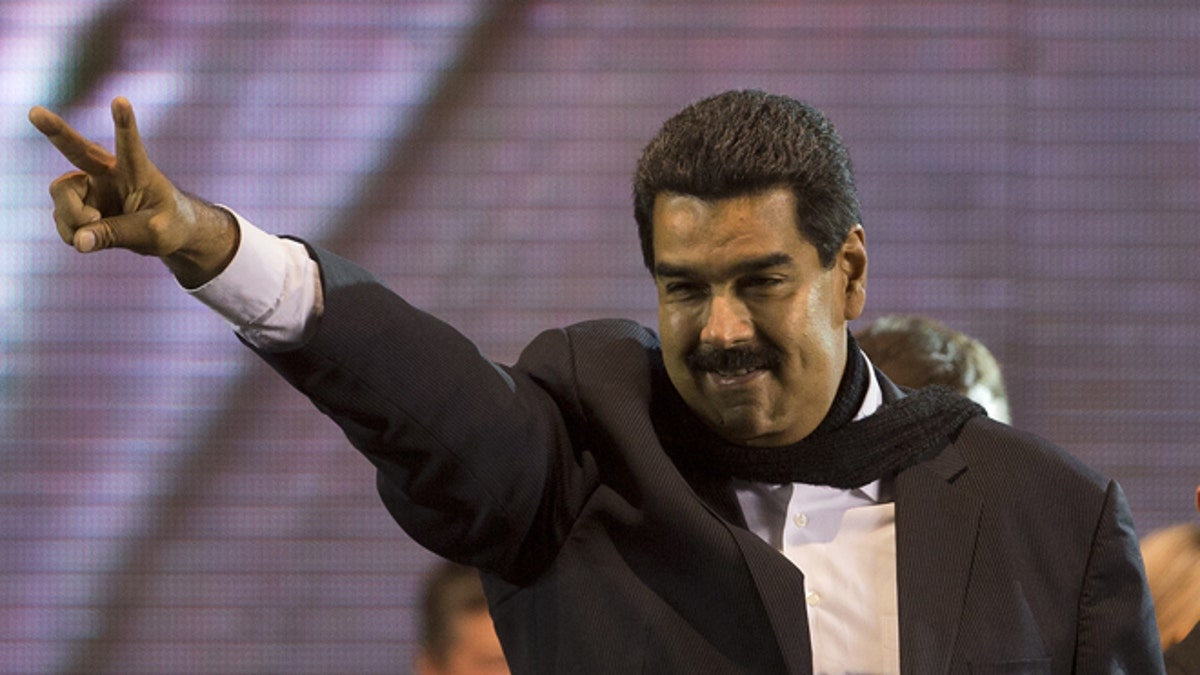
Venezuela's President Nicolas Maduro flashes a victory sign during a rally in Buenos Aires, Argentina, Wednesday, May 8, 2013. Maduro said Venezuela and Argentina are more closely aligned than ever despite the deaths of Venezuelan President Hugo Chavez and of Nestor Kirchner, the husband of President Cristina Fernandez who preceded her in the presidency. (AP Photo/Victor R. Caivano) (AP2013)
Buenos Aires, Argentina – Following the announcement of new energy and food agreements Wednesday, Venezuelan leader Nicolás Maduro cheered supporters of Argentina's President Cristina Fernández de Kirchner with a rousing speech at a soccer-stadium rally.
Maduro said their two countries are more closely aligned than ever despite the deaths of Venezuelan President Hugo Chávez and of Néstor Kirchner, Fernandez's husband who preceded her in the presidency.
"Hugo Chávez Frías and Néstor Kirchner! I feel them hear, more alive than ever!" Maduro said to wide applause.
It was the high point of a regional trip meant to shore up support after Maduro narrowly won an election challenged as fraudulent by his opponent, Henrique Capriles. The disputed outcome and related violence have Venezuelans even more polarized, and Maduro is looking to shore up friends amid questions about the sustainability of the petrodollar diplomacy Chavez spread around the region.
Maduro met earlier with President José Mujica in Montevideo. The Uruguayan leader gave Maduro, who will inherit Mercosur's rotating presidency in June, a boost when he said Venezuela's presence in the trade group is very important. After Argentina, Maduro was heading to Brazil.
Fernandez mobilized "Organized and United," a coalition of pro-government groups that reliably delivers supporters to political rallies, to put on the stadium gathering.
She also announced 11 accords promising more cooperation on energy, technology, transportation and food. Without giving details, Fernandez also said that she and Maduro made progress on new deals between their state-controlled oil companies.
But Maduro's Venezuelan opponents also have gathered at every stop along the way, denouncing him as a threat to democracy.
While Fernandez was sending busloads to fill the 21,500-seat All Boys stadium, his rivals were calling for protesters to gather at Argentina's iconic obelisk. Venezuelan opposition lawmakers also met with their counterparts in Peru, Paraguay, Uruguay, Argentina and Colombia, lamenting together the lack of criticism from the region's presidents.
Maduro dismissed his opponents as "right wing extremists" and said "they can travel to Siberia or Antarctica to complain if they want to."
This trip is purely symbolic because most of the region's leaders already showed their support by attending Maduro's inauguration in Caracas despite Capriles' efforts to challenge the results, said Jorge Restrepo, who directs Colombia's Resource Center for the Analysis of Conflicts.
That has more to do with economic pragmatism and petroleum than a shared ideology, said Iván Garzón, who runs the law and political science departments at the University of La Sabana in Bogota, Colombia.
Venezuela is a huge importer of goods, bringing in $59 billion worth last year. In exchange, it provides a massive amount of oil and natural gas at preferential terms to its Latin American allies.
Maduro is probably telling his allies that Venezuela's petrodollars won't dry up, the analysts said.
"He'll tell Cristina, 'Relax, the checkbook is still working.' The money won't flow as quickly as it did under Chávez, but it's not going to stop tomorrow," Garzón said.
Restrepo agreed: "No one will intervene in Venezuelan politics. It's in no one's interest to do so."
But Argentine Foreign Minister Héctor Timerman dove right into the fray, blaming Maduro's opponents for any violence.
"This is a president who is being attacked by an opposition that doesn't respect election results. There's an opposition that will receive him here as well," Timerman said. "Their line is, 'If I win the elections, they're democratic; If I lose, they're fraudulent.' "
Based on reporting by The Associated Press.
Follow us on twitter.com/foxnewslatino
Like us at facebook.com/foxnewslatino
